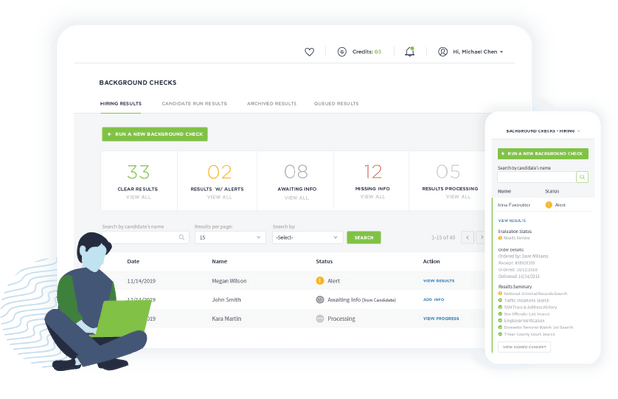What Is The SAM Exclusion List & How Healthcare Employers Use It For Safer Hiring
Learn about the System for Award Management (SAM) and what exclusions mean when screening candidates for your healthcare organization.
Resourcesarticles
Ashley Blonquist
9 min read
From hospitals to consulting firms, employers in the healthcare industry face many risks. A healthcare sanctions check, which searches for any penalties, suspensions, or punitive or disciplinary actions taken against a healthcare professional, can help reduce risk.
Learn how healthcare sanctions checks can streamline the healthcare hiring process and provide peace of mind.
In its most basic definition, healthcare risk management involves preventing issues, situations, or risks that can result in losses, liability, or harm. Some of those risks include:
According to the American Society for Health Care Risk Management (ASHRM), healthcare risk management applies to a variety of companies and organizations in the healthcare industry, including:
Healthcare risk managers wear many hats, hold different titles, and maintain several responsibilities, depending on where they work and their primary focus. They’re also expected to remain proactive and reactive to maintain safety and minimize risks.
According to PolicyMedical, a patient safety company, there are five top priorities for healthcare risk managers:
With all of that in mind, as an employer you may ask, what role do healthcare sanctions checks conducted during the hiring and screening process play in healthcare risk management?
A healthcare sanctions check goes beyond routine screenings employers might conduct, like criminal background checks, and education and employment verification checks. Instead, this screening is used to search more than 1,000 government sources for any penalties, suspensions, or punitive or disciplinary actions taken against a healthcare professional, depending on the positions you’re hiring for and the level of screening conducted.
That search also includes OIG and SAM exclusion lists, which reveal whether a candidate has been sanctioned (and therefore cannot be hired if your organization participates in federally funded healthcare programs).

Here’s a quick breakdown of each of these two most commonly searched healthcare sanctions lists:
Formally called the List of Excluded Individuals/Entities (LEIE), the OIG Exclusion list provides information about people and entities that are currently excluded from participation in Medicare, Medicaid, and all other federal healthcare programs.
Contractors and providers may become excluded for several different reasons, including:
The System for Award Management (SAM) is a database for businesses, organizations, and federal agencies to win US government contracts. This database also houses an exclusion list, which includes contractors that are excluded for other reasons, like violating antitrust statutes, having more than $3,000 in delinquent federal taxes, or violating the Drug-Free Workplace Act.
However, the SAM exclusion list doesn’t provide license information or National Provider Identifier (NPI) records of those excluded—which are needed to verify that your search results accurately match the candidates you screen.
In addition to learning whether a candidate is excluded, a healthcare sanctions check provided by a professional background screener may also verify additional information that the exclusion lists do not, including:
Because healthcare risk management involves preventing several different situations and risks, employers and managers face numerous challenges that can be difficult to navigate. And, failure to navigate situations correctly (and legally) can put your organization further at risk.
When you compare some of the top priorities of healthcare risk management against healthcare sanctions checks, it quickly becomes evident why employers need to invest in such tools, beyond the legal reasons.
As mentioned above, a healthcare sanctions check verifies whether candidates or contractors are on an exclusion list and why. For example, if one of the exclusion reasons is patient neglect or abuse, employers who hire those individuals may be putting their patients’ safety at risk.
In other instances, an individual may be excluded for financial misconduct or fraud. Should you hire this type of excluded candidate, it may risk the quality of patient care, as providers may be more financially motivated rather than focused on providing top-notch services.
Hiring excluded vendors, contractors, or employees isn’t just risky to patient safety—it’s incredibly costly (in dollars and reputation).
The OIG enforces penalties of $10,000 per claim filed for each service performed by sanctioned employees. What’s more, the consequences of hiring sanctioned employees can put organizations at risk of losing federal funding for Medicare, Medicaid, and other programs.
A healthcare sanctions check is a proactive way to mitigate the risks of hiring such individuals and possibly paying penalties.
Since manually searching exclusion lists and navigating complicated compliance regulations is time-consuming, hiring teams can order healthcare sanctions checks through an accredited Consumer Reporting Agency (CRA) or professional background screener, which performs the searches for them.
While it’s not listed as one of the top five priorities for healthcare risk managers, compliance is always top-of-mind for organizations, hiring teams and healthcare risk managers. That’s because non-compliance is also detrimental to your budget and company reputation.
And, with so many necessary steps needed to screen candidates in the healthcare field, it’s important to comply with various federal, state, and local laws and regulations every step of the way. That also includes compliance with the Fair Credit Reporting Act (FCRA) and adverse action steps.
With healthcare sanctions checks through a acreener like GoodHire, you can have peace of mind that compliance is taken into account throughout the process, helping protect your company and the rights of the candidates being screened.
Bottom line: Healthcare sanction checks play an important role in healthcare risk management and as a part of any comprehensive background check.
In addition to conducting in-depth searches and providing accurate results, GoodHire also provides the option to add Ongoing Alerts for sanctions checks. These can inform you if a current employee has been recently added as an excluded individual—helping you and your risk management team continue a proactive approach to complicated jobs and tasks.
The logic behind healthcare sanctions searches is easy for hiring managers to understand, but the details of conducting them are incredibly challenging and tricky. That’s why it makes sense to invest in the help of experts to conduct employment screening, healthcare sanctions checks, and compliance with fair-hiring regulations.
GoodHire’s employment screening services and healthcare sanctions checks can help you and your healthcare risk managers (and all healthcare employers) streamline and simplify the process through thorough searches, accurate results, easy-to-read reports, and monitoring alerts.
Find out if your healthcare candidates are in good standing. GoodHire offers sanction checks and hundreds of employment screening services.

The resources provided here are for educational purposes only and do not constitute legal advice. We advise you to consult your own counsel if you have legal questions related to your specific practices and compliance with applicable laws.
Learn about the System for Award Management (SAM) and what exclusions mean when screening candidates for your healthcare organization.
Let’s take a closer look at the DEA Doctor Watchlist, how to access it, and how using it during the screening process can help you make more informed hiring decisions.
Use this guide to learn how to navigate the Medicaid Exclusion List to hire qualified candidates and avoid OIG penalties while protecting your organization.